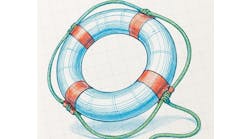Why is a little knowledge dangerous? Because when we learn a little, we begin to think we know everything. Next stop, destructive decisions.
Of course, we all gain experience as we get older. However, the really wise guys, like the philosopher Socrates and others, report that all the knowledge they've gained really shows them how much more they still have to learn.
In my case, when researching this issue's feature article, "The Expert Inside," about embedded intelligence in level instruments, I approached it in what I assumed was a logical way based on years of previous coverage—level instruments are generally older technologies that are being joined by younger microprocessors, software and Ethernet ports. Sounds reasonable, right?
Well, as soon as I started talking to people who know what they're talking about, I learned that level devices and computer chips had more history than I realized. The experts at Endress+Hauser and VEGA Americas patiently explained to me that traditional level technologies are decades old, but several radar, ultrasonic, laser and other methods are relatively new, and have been greatly aided in their evolution by data processing. In fact, they reminded me that microprocessors have been working in or nearby level measurement equipment for 20 years or more. As a result, most of today's level methods evolved so closely entwined with computers and software that they wouldn't even be possible if their components hadn't been coordinated and controlled by data processing functions all along.
This was a complete turnaround from how I thought this story was going to unfold, but these surprises happen to me pretty often, so I've grown used to them. That's probably the only small advantage of being a superficial journalist—I'm always the greenhorn, so it's easier for me to accept what comes. I can also appreciate that more deeply set roots might be harder to readjust, pull out, or relocate.
At the same time, I also began to appreciate that my editor Paul Studebaker's initial concept of "the expert inside" might be even older than data processing. I mean, just because a computer isn't doing calculations inside a level measurement device doesn't mean its users aren't directly benefiting from the expertise and innovation inherent in its design and construction. I'm sure the first users who put a magnetic float in a tank were pretty pleased that they didn't have to put their heads and a line or stick in as often anymore, but they probably weren't aware that everyone who came after them could take advantage of their innovation.
We've all heard that we're standing on the shoulders of giants, but it's easy to forget they're there. This is why it's important to remember that the creativity of the magnetic float guy depends on the non-magnetic float guy, and both of them are based on the guys with the lines and sticks, and whoever invented the tanks and vessels in the first place.
Perhaps inevitably, we've relied on so many technical innovations for so long that they've become invisible. We forget that every tool we pick up is accompanied by its inventor's spirit at our elbow, maybe saying something like, "Pretty cool, huh? It sure got me out of a jam and helped me do my job. Maybe you can do me one better?"
However, especially because innovations roll in as fast as they've done in recent years, we can get a little numbed by the information overload. This causes many of us to fall back on the belief that we've seen it all, we know it all, and that we couldn't possibly come up with anything new. Remember the 19th century patent official who said everything that could be invented had already been invented?
Of course, prejudice's best buddy is laziness. What's the harm in disliking change, wanting things to stay same or go back to the way they were? Well, what we miss out on is innovations we could have created, satisfaction we could have experienced, friends and loves we could have had, and the brighter world we could have been part of. No big loss, right?




